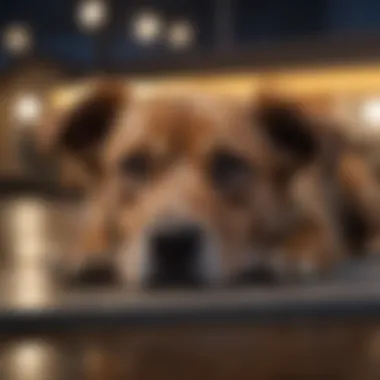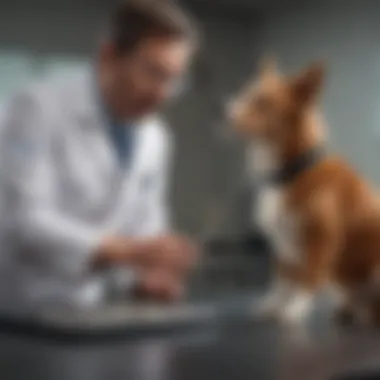Understanding Nocturnal Diarrhea in Dogs: Causes and Management


Intro
Nocturnal diarrhea in dogs can be a distressing issue for both pets and their owners. Understanding this condition is essential for effective management. Pet owners may notice their dogs experiencing loose stools or frequent bowel movements during the night. While this may seem like a minor problem, it can signal underlying health issues that require attention.
Diarrhea that occurs at night can disrupt both a dog's sleep and that of its owner. It's crucial to recognize that various factors contribute to this condition. Therefore, understanding possible causes and symptomatology is the first step toward addressing the issue. In this article, we will delve into the different reasons behind nighttime diarrhea and discuss strategies to care for affected dogs, ultimately helping pet owners enhance their pets' well-being.
Preamble to Canine Diarrhea
Diarrhea in dogs is not merely an inconvenience. It can signal underlying health issues that require attention. Understanding the fundamentals of canine diarrhea is crucial for any dog owner. By identifying the symptoms and knowing the potential causes, pet owners can ensure their pets receive appropriate care when necessary.
Defining Diarrhea in Dogs
Diarrhea is defined as an increase in the frequency, fluidity, or volume of bowel movements. For dogs, any deviation from their normal stool consistency is noteworthy. Diarrhea can be acute, lasting a few days, or chronic, persisting for several weeks. It may present in various forms, from soft stools to watery diarrhea. Different types of diarrhea can manifest due to various factors, including dietary changes, illnesses, or infections. Therefore, precise identification and observation of stool consistency are essential for diagnosis and management.
Pet owners should monitor their dog's bowel habits closely. Changes in soft stool texture or frequency can indicate issues beyond mild dietary indiscretion.
Why Timing Matters
Timing plays a significant role in addressing nocturnal diarrhea. Many pet owners may notice their dogs experience diarrhea primarily during the night. This pattern can lead to sleepless nights for both the pet and owner alike. Understanding these timings helps distinguish between various potential causes.
Changes in bowel movements at night can often relate to dietary habits or stress-related triggers experienced during the day. Frequently, when nocturnal diarrhea occurs, it may coincide with other underlying health issues that warrant investigation.
Owners should consider keeping a detailed record of their pet's bowel movements, including the times they occur. This information can aid veterinarians in diagnosing any potential conditions that might be affecting the dog. Monitoring such patterns can also provide insights into dietary sensitivities and stress responses specific to nighttime behavior.
Common Causes of Nocturnal Diarrhea
Understanding the common causes of nocturnal diarrhea is crucial for dog owners. It allows them to recognize potential issues that their pets may experience, leading to timely intervention. Nighttime diarrhea can disrupt the lives of both pets and their owners. It often signals underlying health concerns or improper dietary practices. Therefore, pinpointing the exact cause helps in managing the condition effectively.
Dietary Indiscretions
One of the primary reasons for nocturnal diarrhea in dogs stems from dietary indiscretions. This can happen when a dog inadvertently consumes something outside its usual diet. For example, common scenarios include eating table scraps, spoiled food, or even non-food items such as wrappers or toys. Such actions can lead to gastrointestinal upset, resulting in diarrhea, particularly during the night.
Pet owners should be vigilant about what their dogs eat. Monitoring their diets is essential to avoid sudden changes that could lead to digestive upset. If a dog consumes something that it cannot tolerate, symptoms may quickly manifest. Keeping a close eye on their consumption habits can help to prevent these incidents.
Food Intolerance and Allergies
Food intolerance and allergies are significant contributors to nocturnal diarrhea in dogs. These conditions arise when a dog's immune system reacts negatively to certain ingredients in its food. Common allergens include proteins like chicken, beef, or dairy. Symptoms may not always appear immediately after the dog ingests the offending ingredient. Often, it can take days for symptoms like diarrhea, vomiting, or excessive flatulence to manifest.
Identifying food intolerance requires careful observation and sometimes elimination diets. Pet owners may consult with a veterinarian to determine the best approach to identifying the specific food triggering the issue. This can help ensure the dog receives a balanced diet that does not provoke an adverse reaction.
Infections and Parasites
Infections and parasites can also lead to nocturnal diarrhea. Bacterial infections, such as Salmonella or Campylobacter, can disrupt the dog's digestive system. Furthermore, parasitic infestations like Giardia or roundworms are especially notorious for causing gastrointestinal distress. Symptoms often include watery stools, sometimes with blood or mucus.
To prevent these issues, regular veterinary check-ups and vaccinations are essential. Maintaining good hygiene, such as proper waste disposal and avoiding contaminated water, can also help mitigate risks. If a dog presents with signs of infection or parasite infestation, prompt veterinary attention is essential.
Health Issues and Malabsorption Syndromes
There are various health issues that can lead to nocturnal diarrhea in dogs. These include conditions like pancreatitis, inflammatory bowel disease, and certain cancers. Malabsorption syndromes can hinder the dog's ability to utilize nutrients from food effectively, leading to diarrhea.


Identifying the underlying health issue often involves comprehensive diagnostics. This can include blood tests, ultrasounds, or biopsies. Pet owners should stay alert for changes in their dog's health, such as weight loss, lethargy, or change in appetite. These signs warrant immediate veterinary consultation to address any possible serious conditions.
Behavioral Factors Contributing to Diarrhea
Understanding the behavioral factors that contribute to nocturnal diarrhea in dogs is essential for pet owners wishing to maintain their dog's health. Emotional well-being can have significant effects on a dog's gastrointestinal system. Stress, anxiety, and disruptions to their routine can lead to a variety of digestive issues, including diarrhea during the night. Recognizing these factors allows pet owners to provide better care and create a supportive environment.
Stress and Anxiety
Stress is a common factor that can trigger diarrhea in dogs. Various situations can cause anxiety, such as loud noises, unfamiliar environments, or changes in family dynamics. Dogs that experience stress may not only show signs of nervous behavior but also suffer from digestive problems. A stressed dog often experiences adrenaline surges, which can lead to gastrointestinal upset.
Pet owners should observe their dog's behavior for signs of stress such as:
- Excessive barking
- Hiding or withdrawal
- Pacing
- Loss of appetite
When a dog experiences anxiety, their digestive system may react negatively, resulting in diarrhea. It is important for owners to identify the source of stress and mitigate it when possible. Creating an environment that fosters calmness can make a significant difference.
Changes in Routine
Dogs thrive on routine. Any significant change can upset their emotional balance. This includes alterations in feeding schedules, exercise patterns, or even family member routines. When a dog’s day-to-day activities are disrupted, it can lead to confusion, triggering stress that manifests as diarrhea.
To help minimize the impact of these changes, consider the following strategies:
- Maintain consistent feeding times.
- Regular exercise routines help stabilize their energy levels.
- Gradually introduce changes rather than making sudden shifts.
In summary, recognizing the impact of stress and routine changes is crucial in understanding nocturnal diarrhea in dogs. By addressing these behavioral factors, pet owners can help facilitate better digestive health and enhance their furry companions' overall quality of life.
Understanding the behaviors that lead to digestive issues is as important as recognizing dietary factors in canine health.
Signs to Watch For
Understanding the signs associated with nocturnal diarrhea in dogs is crucial for pet owners. Early recognition of symptoms can significantly influence the management and outcome of the condition. Both physical symptoms and behavioral changes provide important clues about the underlying issues causing diarrhea. Being alert to these signs can help pinpoint the severity and guide timely veterinary intervention when necessary.
Physical Symptoms
Physical symptoms are often the most evident indicators that your dog may be experiencing nocturnal diarrhea. These can include the following:
- Loose stools: Assessing the consistency of your dog's feces can aid in determining the severity of diarrhea. Noticing anything from soft stools to complete liquid can be a strong signal.
- Frequency of bowel movements: Increased urgency during the night can disrupt not only your dog's sleep but also yours. If your dog is needing to go outside multiple times, this may point to an underlying issue.
- Presence of blood or mucus: Blood in the stool is concerning and warrants immediate veterinary attention. The same applies to any unusual discharge such as mucus or a significant change in coloration.
- Vomiting or gas: If these symptoms accompany diarrhea, they may indicate more serious health problems requiring assessment.
- Dehydration signs: Keep an eye out for symptoms of dehydration such as excessive thirst, dry gums, or lethargy. Severe dehydration can lead to complications.
Recognizing these signs requires vigilance. Early detection can ensure that treatment begins sooner and may prevent further complications.
Behavioral Changes
Behavioral changes can sometimes be just as telling as physical symptoms when it comes to nocturnal diarrhea in dogs. Observing these alterations helps in assessing your dog's overall condition. Look for the following:
- Restlessness or pacing: If your dog is unusually restless or unable to settle down at night, this behavior may relate to discomfort from diarrhea.
- Increased anxiety or distress: Some dogs may show signs of stress when their digestive system is upset. This can manifest as whining, barking, or hiding.
- Changes in appetite: A sudden decrease in food intake or interest in treats may be an indicator of nausea or other gastrointestinal discomfort.
- Withdrawal from social interactions: If your normally friendly dog is becoming withdrawn or shy, this could be a response to feeling unwell.
Understanding these behavior changes is essential. They can provide context to the physical symptoms and help narrow down potential causes of the diarrhea. It is important to keep a close watch on your dog's behavior, as even subtle changes might signal a health concern.
In summary, recognizing both physical and behavioral signs is vital in managing nocturnal diarrhea in dogs. Early identification leads to prompt intervention, ultimately supporting your pet's health.
When to Seek Veterinary Attention


Recognizing when to seek veterinary attention for nocturnal diarrhea in dogs is critical. This decision can greatly affect your pet's health and recovery. Certain symptoms warrant immediate veterinary care, and understanding the difference between mild and severe symptoms is essential for every pet owner. Moreover, some underlying health concerns may need urgent assessment.
Mild vs. Severe Symptoms
When evaluating your dog's condition, observe the symptoms closely. Mild symptoms of nocturnal diarrhea may include occasional loose stools and slight discomfort. Usually, these can be managed at home with dietary adjustments or over-the-counter remedies. However, you should consider seeking veterinary advice if the diarrhea persists beyond 24 hours.
In contrast, severe symptoms may indicate a serious health issue. Some signs that require immediate attention are:
- Frequent vomiting: If your dog vomits multiple times or shows signs of distress.
- Blood in stool: This can be a sign of infection or a more severe gastrointestinal issue.
- Extreme lethargy: If your dog shows no interest in activity, this can indicate underlying problems.
- Severe dehydration: Check for dryness in the gums or loss of skin elasticity.
If your dog displays any severe symptoms, do not delay in contacting your veterinarian. Early intervention can prevent complications and lead to better outcomes.
Underlying Health Concerns
Nocturnal diarrhea can be a symptom of underlying health issues that may not be immediately apparent. Conditions such as pancreatitis, inflammatory bowel disease, or even tumors can affect your dog’s gastrointestinal tract. In some cases, infections from parasites or bacteria can lead to sudden changes in bowel habits.
Other medical issues to watch for include:
- Kidney or liver disease: These organs play vital roles in digestion and metabolism.
- Hormonal disorders: Such as diabetes or Cushing's disease, can disrupt normal digestion.
- Autoimmune disorders: These can lead to inflammation of the intestines.
If there are indications that your dog's diarrhea could be linked to one of these conditions, a thorough veterinary examination is necessary. Your veterinarian may suggest laboratory tests or imaging studies to diagnose the underlying problem. Addressing these health concerns promptly can prevent long-term issues and help ensure a quicker recovery for your pet.
"Early detection of gastrointestinal issues in dogs can lead to more effective treatment and better long-term health outcomes."
In summary, being vigilant about your dog's symptoms is crucial. Understanding the distinctions between mild and severe symptoms, as well as recognizing potential health concerns, helps guide your decision to seek veterinary attention. Your proactive approach can make a significant difference in your pet's overall well-being.
Diagnostic Procedures
In the context of nocturnal diarrhea in dogs, diagnostic procedures play a crucial role. Recognizing that the underlying cause influences effective treatment is central to managing this condition. A thorough examination can help differentiate between dietary indiscretions, infectious agents, or more serious health conditions. By engaging in proper diagnostic practices, veterinarians can tailor treatment plans to the specific needs of the dog, thereby enhancing recovery outcomes.
Veterinary Examination
The veterinary examination serves as the primary step in identifying the cause of nocturnal diarrhea. During this examination, the veterinarian will take a comprehensive history of the dog's symptoms and overall health status. Details such as the duration of diarrhea, frequency, dietary habits, and any other noticeable behaviors are instrumental in guiding the investigation.
A physical examination will assess the dog’s hydration status, abdominal pain, and overall condition. This initial evaluation is essential as it helps rule out any obvious issues. For example, a distended belly might indicate a blockage, while signs of dehydration can signal prolonged diarrhea. In many cases, palpating the abdomen can reveal tenderness that might indicate underlying health issues.
Furthermore, assessing the dog's memory and behavior can add context to the physical findings. The veterinarian may ask about stressors or changes in routine to see if behavioral factors are at play. This holistic approach ensures that both physical and behavioral factors are considered in diagnosing the problem.
Laboratory Tests
Laboratory tests complement the veterinary examination and provide valuable insights. These tests can include blood tests, fecal examinations, and perhaps imaging studies, depending on the findings from the physical assessment.
Blood tests can reveal underlying infections or diseases affecting the liver, kidneys, or pancreas. For instance, elevated white blood cell counts may indicate an infection, whereas abnormal liver enzymes can suggest liver disease.
Fecal examinations are equally as important. They can detect parasites, bacteria, or even certain viruses, all of which could lead to diarrhea. Understanding what is present in the feces enables veterinarians to provide targeted treatment. In some cases, they may also recommend specialized tests to check for specific pathogens or metabolic disorders.
Imaging, such as X-rays or ultrasonography, might be warranted if internal issues are suspected. These modalities can help visualize any obstructions, masses, or abnormalities in the digestive tract. Such detailed examination aids in forming a complete picture of the dog’s health status.
Diagnosing nocturnal diarrhea effectively requires a combined approach of thorough examination and targeted laboratory tests.
In summary, the establishment of an accurate diagnosis for nocturnal diarrhea in dogs hinges on well-coordinated diagnostic procedures. The veterinary examination provides the initial framework, while laboratory tests fill in the gaps. This comprehensive approach is essential for developing an effective treatment strategy.


Management and Treatment Options
Management and treatment of nocturnal diarrhea in dogs is a crucial element in ensuring the overall health and well-being of pets. The appropriate means of addressing this condition involves a careful diagnosis followed by tailored interventions. This process can help pet owners not only to manage the current episodes of diarrhea but also to prevent future occurrences. Understanding how to effectively manage dietary, medicinal, and hydration aspects can improve outcomes significantly.
Dietary Management
Dietary management is often the first step in addressing nocturnal diarrhea. A well-balanced and appropriate diet is key to a dog's digestive health. Here are some critical considerations:
- Identify Trigger Foods: Observing what your dog eats can highlight possible food intolerances or allergens. Transitioning to hypoallergenic or limited-ingredient diets may be beneficial in these cases.
- Fiber Inclusion: Adding fiber to the diet can help solidify stool. Ingredients like pumpkin and sweet potatoes are gentle and beneficial.
- Feeding Schedule: Consistent feeding times can help stabilize digestion. Keeping an eye on the quantity of food is also important to avoid overfeeding, which can lead to digestive distress.
- Gradual Dietary Changes: Any shifts in diet should be done slowly to give the dog's system time to adjust, reducing the risk of further digestive issues.
Medications and Supplements
In some cases, dietary management may need to be complemented with medications or supplements. Here are important points to consider:
- Antidiarrheal Medications: Over-the-counter options, like loperamide, may be appropriate in certain scenarios. However, it is essential to consult with a veterinarian before administering any medication to ensure there are no underlying health issues.
- Probiotics: Introducing probiotics can help restore healthy gut flora. This can be crucial for dogs experiencing diarrhea due to bacterial imbalances.
- Prescription Medications: In more severe cases, the veterinarian may prescribe medications targeted at underlying infections or inflammation that needs attention. Always follow the veterinarian's instructions for dosage and duration.
Hydration and Electrolytes
Maintaining hydration during episodes of diarrhea is essential. Diarrhea can lead to fluid loss, putting dogs at risk of dehydration, which worsens their condition. Here’s what to keep in mind:
- Encourage Water Intake: Ensure your dog always has access to fresh water. If they are reluctant to drink, consider offering ice cubes or special pet hydrating solutions.
- Electrolyte Solutions: In cases of significant fluid loss, electrolyte solutions designed for pets are available. These can help replenish lost minerals and keep hydration levels stable.
- Monitor Hydration Levels: Check your dog's hydration status by assessing the elasticity of their skin and checking their gums. Dry gums and lack of skin rebound can indicate dehydration and should be addressed by a vet.
Monitoring your pet’s health is vital. If diarrhea persists more than a day or is accompanied by other symptoms, seek veterinary advice promptly.
By employing informed management strategies across these areas, pet owners contribute to a positive recovery experience for their dogs. This proactive approach not only addresses current issues but also sets the foundation for better long-term digestive health.
Preventive Measures
Preventive measures are essential in managing nocturnal diarrhea in dogs. By taking appropriate steps, pet owners can minimize the risk of these episodes and promote overall gastrointestinal health. This section covers dietary considerations and the importance of routine veterinary care as critical components of prevention.
Dietary Considerations
The foundation of a dog's health lies in its diet. Proper nutrition is vital for preventing gastrointestinal disturbances. Here are several dietary considerations:
- Consistent Feeding Schedule: Dogs thrive on routine. Maintaining a regular feeding schedule can help stabilize their digestive systems. This reduces chances of dietary indiscretion.
- High-Quality Food: Opting for premium dog food with natural ingredients can help minimize food intolerances. Look for formulas that avoid fillers like corn and soy, which may irritate some dogs' stomachs.
- Gradual Changes: When changing your dog's food, do so gradually. Sudden shifts can upset the stomach. A transition over a week or more is often best.
- Supplements: Probiotics and digestive enzymes may support a healthy gut. These supplements can balance gut flora and enhance digestion, serving as an effective preventive strategy against diarrhea.
Routine Veterinary Care
Regular veterinary visits are crucial in identifying and addressing potential health issues before they escalate. Here are key points related to routine care:
- Regular Check-Ups: Scheduled veterinary examinations can detect underlying health problems early. Routine blood tests and stool checks can uncover infections or parasites that might contribute to diarrhea.
- Vaccinations and Preventatives: Staying current with vaccinations and preventatives, such as flea and tick treatments, can reduce the risk of conditions that trigger diarrhea. Diseases like parvovirus can severely affect digestive health.
- Discussion of Changes: If there are noticeable changes in your dog's behavior or diet, discuss these with your veterinarian. They can provide tailored advice and determine if further investigation is needed.
"Prevention is better than cure. Understanding dietary needs and maintaining regular veterinary care are key to a dog's long-term health."
By focusing on dietary management and committing to routine veterinary care, pet owners can significantly reduce the likelihood of nocturnal diarrhea in their dogs. This proactive approach contributes to not just immediate wellness but also fosters a longer, healthier life.
The End
In this article, understanding nocturnal diarrhea in dogs becomes a crucial focus of discussion. This condition is not just a trivial inconvenience; it can signal serious underlying health issues that require immediate attention. Recognizing the symptoms early can lead to better outcomes and improved quality of life for the dog.
Summary of Key Points
- Causes of Nocturnal Diarrhea: It is important to not dismiss nighttime diarrhea as mere dietary problems or temporary gastrointestinal upset. Numerous factors can play a role, including dietary indiscretion, allergies, infections, and more serious diseases. Each cause may warrant a different approach in management.
- Signs and Symptoms: Vigilance in observing how a dog behaves and how often these episodes occur can provide essential clues. Symptoms such as lethargy, changes in appetite, or any signs of distress should be monitored closely.
- Management Strategies: Early intervention, dietary adjustments, and proper veterinary care are vital in effectively managing this condition. Pet owners should not rely solely on over-the-counter medications without professional advice.
- Preventive Measures: Being proactive about diet and regular veterinary check-ups can prevent many underlying issues from developing into nocturnal diarrhea.
Encouragement for Vigilance
Pet owners should remain attuned to their dog's health. Nighttime diarrhea should not be ignored, regardless of its perceived severity. The well-being of a pet often depends on the owner's knowledge and awareness. Observing patterns and being ready to act on concerning signs is a responsible approach. By doing so, potential health concerns can be addressed before they escalate, ensuring your pet's health remains a top priority. Remember, being informed and observant can make all the difference in achieving a happier, healthier life for your dog.



